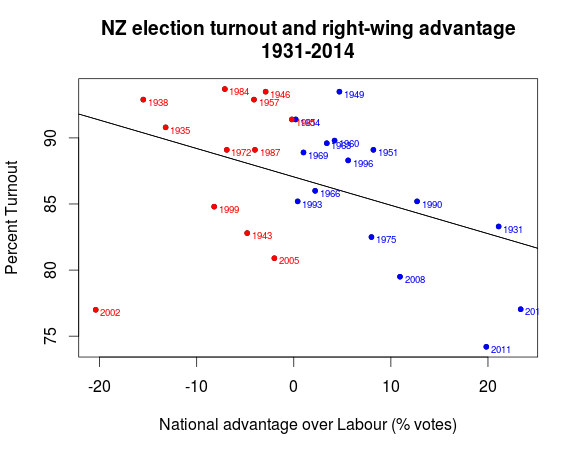So, why didn't New Zealanders vote?
Demographics be the first answer to try. Which group of New Zealanders didn't vote? Of course non-voters might have different hypothetical preferences to people who fit in similar demographic boxes, but who are voters. But it might give us some idea. Statistics NZ is likely to be collecting that kind of data. In the past, it's been less-educated, younger, and non-white ethnic groups that have less of a say.
Alternatively, we could ask people why they didn't vote. Statistics NZ did that last time around, and this is what they found:
A number of these reasons seem to relate to whether it's perceived there's a real choice voters can make. If:
- 64% of non-voters had considered voting in this Election.
- 43% of non-voters decided on Election Day that they would not vote.
- 41% of non-voters put just a little thought into whether or not to vote, and 29% didn’t think about it at all.
- The main overall reasons for not voting were that they had other commitments (14%) or work commitments (9%), could not be bothered voting (14%), couldn’t work out who to vote for (11%) and that their vote would not make a difference (8%).
- 33% of all non-voters agreed ‘I don’t trust politicians’ was an important factor (4 or 5 out of 5) on their not voting. Other important factors were ‘it was obvious who would win so why bother’ (31%), and I’m just not interested in politics (29%). Since 2008 there has been an increase in the proportion of non-voters saying ‘it was obvious who would win so why bother’ (from 19% to 31%).
- the result seems predetermined
- one side seems particularly appealing
- the other side seems particularly unappealing
- there doesn't seem to be much real difference between the candidates/parties
Does this bear out across previous elections in New Zealand?
We can look at the margin between the two sides to see whether more people turn out to vote when there's a very close election, compared to when there's not much of a real choice.
The graph above shows the percentage turnout for each election between 1931 and 2014, excluding 1978 when data was not available. Elections with a National advantage are shown as a blue dot; elections with a Labour advantage are shown as a red dot. There does seem to be a significant trend apparent: the greater the margin between political parties, the lower the turnout (ρ[43]=-.41, p=0.033). So it seems like turnout has something to do with whether voters thought there was a genuine contest.
Does this effect seem to work on Labour supporters more than National supporters? Maybe National voters are habitual voters who reliably turn out every election, while left-wing voters only really come out if they can see a party worth supporting, a genuine choice, and a genuine chance of winning. We can take a look at the data above from a different angle:
The graph shows elections between 1931 and 2014, excluding 1978 where data wasn't available. National wins (those with “advantage” greater than 0, on the right side) are shown with a blue dot. Labour wins (those with “advantage” less than 0, on the left side) are shown with a red dot. It looks as if when turnout gets worse, National does significantly better in elections (r[43]=-.41, p=0.035).
So what does it mean? It seems like as the gap between the percentage of votes for each of the major parties increases, turnout gets lower. It's hard to say which direction the effect is in, but it does seem like voters for the losing side just doesn't turn out. Also, that effect might apply more when Labour's losing, because in general, National does better when turnout is low, while Labour does better when turnout is high.
If this pattern applied for the last election, where turnout was among the lowest ever, then the low turnout, and National's MMP 'landslide', is at least in part due to the lack of choice voters felt. Maybe it seemed like the outcome was inevitable. Or, voters didn't think Labour represented a real alternative – either because they weren't much different from National, or they didn't seem to be a better government than National, due to policy or leadership or some other reason.
If this election was generally like past elections, then low voter turnout, a landslide for National, and the lack of good alternatives are probably all linked.
Sources
http://www.elections.org.nz/events/past-events/general-elections-1853-2011-dates-and-turnout
http://www.elections.org.nz/news-media/preliminary-results-2014-general-election
Raw data and statistical analysis code is available on request.


